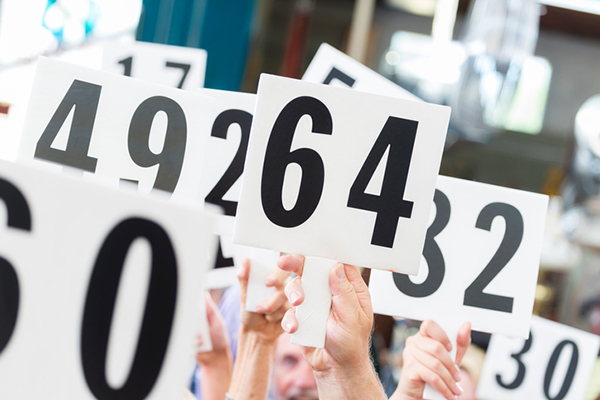Downsizing and dispersing estate personal property can be challenging. In this series of four articles I have attempted to give you readers information to make knowledgeable decisions. The first article discusses finding a qualified appraiser. The second article discusses the ins and outs of estate sales as an option. This third in the series will discuss some of the pros and cons of property auctions as an option. The fourth will look further into choosing an estate sale or auction or both. It is my hope you will find the information valuable when faced with the challenge of downsizing or handling the responsibility of estate personal property. Selling at property auctions is very different from a ‘tag’ or estate sale.
Pros and Cons of Property Auctions:
Pro: Everything is most often sold. You have it done. You do not have to handle the property again or figure out other alternatives for anything remaining after the auction.
Con: Everything is sold…no matter at what value. Items are often grouped into box lots, display can be minimal. Results can be mixed, good, or devastating to actual value, the bidders set the selling price. If there is no interest the item can be “passed” and not sold.
Pro: Major auction houses are a very good and often best option for selling quality, rare, or very desirable valuable items such as fine art, antiques, and major scarce collectibles.
Con: Shipping costs to get items to an auction are usually your responsibility. If an auction house wants the item(s) badly, they may share or absorb that cost for you. Shipping is expensive, especially for items like furniture or very fragile items which will need to be specialty crated or packaged.
Pro: Major property auctions offer extensive advertising to reach both national and international audiences. Region auctions also have a lesser or usually good advertising range. To determine which items should go and for shipping insurance, it is advisable to have a qualified appraiser of personal property (1st article) determine insurance value for you and optimally also fair market value to enable you to judge if the auction estimates are in the range of that fair market value. Auction sales are at fair market value which is what you as a private individual can expect to sell an item in a proper market. Marketing-advertising is part of the commission you pay to the auction house and not an additional expense. That is a big plus due to the larger audience they attract.
Con: Regional and especially local auctions do not have the marketing reach of large auction houses. Local auction audiences can be small which limit sale results. The smaller the auction house, the more you can expect grouping, lesser advertising, and lower results. You will be at the mercy of who happens to attend, and if the items you have to offer are attractive or needed by the attendees even if a few people show up, the auction goes on. Choose your auction house carefully by reputation and past results.
Tips for Major Auctions
Auctions charge a commission on the sale of your items. The seller pays from the hammer price. An additional commission is charged on top of the hammer price to the buyer at major auctions. Your resulting sale will be based on the hammer price. Auction commissions vary from 15% up. A commission price of 20% is fairly normal to sellers but can sometimes be negotiated.
- If you wish the estate name or your name to remain anonymous, you are too busy to handle all the many details connected with auction houses, or not comfortable handling the details yourself, I advise finding a marketing broker agent to represent you in handling the details. A qualified appraiser or qualified individual who commonly represents clients in this way can contact the auctions, send photos, communicate by email, schedule shipping, attend the auction either in person or online, handle after auction details, and some are good at negotiating better commissions and cutting any extra fees. Always check qualifications and recommendations, experience, and how you yourself interact with the agent.
- Read the contract carefully! Auction contracts are written all to the benefit of the auction house and to protect their interests and liability. It is perfectly okay to negotiate the terms and even the commissions. Most expect you to.
- Additional fees are often written into the contract or suggested by the auction house. You can negotiate which ones you want, having them include them at no charge (if item(s) are very desirable to them) and which ones you do not need or want added.
- Make sure you work with the auction house on scheduling (re: auction date, shipping date needed to get there in time for them to do the necessary research and marketing, insurance, any needed cleaning or repairs and who will do them, authentication when needed, etc.).
- The history (called “provenance”) of an item which can greatly improve desirability to collectors and resulting sale price. Give as much information about the ownership, repairs, restorations, exhibitions, or any detail you know about the item(s).
- Research auction houses you plan to approach. What is their reputation? What have they sold similar items for in the past (archived auctions). Note: auction houses do not like items to be “shopped” so approach one auction at a time. If a few are not interested, that is your clue that a regional or local auction may be more appropriate or your information and photos are not adequate.
- Work with the auctions to ascertain estimates then reserves need to be addressed. What is the bottom price you will sell the item or risk it not selling? Most major auctions offer an estimate range of expected sale price and a starting price.
- Make sure there are no secondary auction offerings of your items without your knowledge and permission. Ask about their practices and make sure you agree to any such arrangements.
Tips for Regional or Smaller Local Items
Smaller auction houses may or may not have an additional percentage charge to buyers. Your sale as the seller is always based on the hammer price.
- Check out their reputation!! This is critical.
- Does the auction company pick up or do you need to deliver to the auction premises? Do they sell on location (on your property)?
- Ask how they group items!
- Do they allow reserves on valuable items? A reserve is the bottom line you are willing to sell an item. The reserve should be very realistic or the item will probably be passed (not sold).
- Does the auction have a contract? Should! Do they provide an inventory (lots) of how they intend to sell the items? Read and discuss any issues that are of concern.
- Attend an auction prior to yours if at all possible. If possible, attend several before making a decision of who to hire.
- Always attend the auction yourself or send a representative to record the selling prices.
- Make sure there is no “after auction” sales. Unethical auctions have in the past “reopened” the auction after the main public has left.
Hopefully you feel more knowledgeable and confident about the auction process after digesting this article. Learn as much as you can about your choice, check out their reputation, their process of selling and their advertising. Understand and approve/disapprove or negotiate extra fees beyond the commission. Lastly and very important, understand their accounting method and what your recording process you will receive for the sale of your items.
The last (fourth) in this series for downsizing and estate selling information, how to, and tips will appear next month. This last article will address the pros and the cons of deciding between offering your personal property or estate at an estate sale or an auction or using both services.







